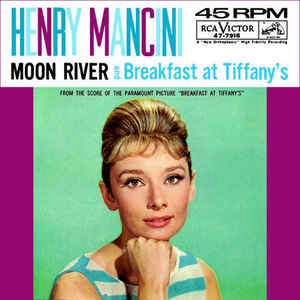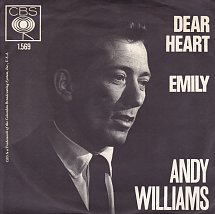Related Research Articles

Howard Andrew Williams was an American singer. He recorded 43 albums in his career, of which fifteen have been gold certified and three platinum certified. He was also nominated for six Grammy Awards. He hosted The Andy Williams Show, a television variety show, from 1962 to 1971, along with numerous TV specials. The Andy Williams Show won three Emmy awards. He sold more than 45 million records worldwide, including more than 10 million certified units in the United States.

"Moon River" is a song composed by Henry Mancini with lyrics by Johnny Mercer. It was originally performed by Audrey Hepburn in the 1961 movie Breakfast at Tiffany's, winning an Academy Award for Best Original Song. The song also won the 1962 Grammy Awards for Record of the Year and Song of the Year.
"Canadian Sunset" is a popular song with music by jazz pianist Eddie Heywood and lyrics by Norman Gimbel. An instrumental version by Heywood and Hugo Winterhalter reached No. 2 on the Billboard Hot 100 chart and No. 7 on the R&B chart in 1956. A version sung by Andy Williams was also popular that year, reaching No. 7 on the Billboard chart. The Sounds Orchestral, conducted by Johnny Pearson, hit the Easy Listening chart reaching No. 14 and the Billboard Hot 100 in 1965 reaching No. 76.

"(Where Do I Begin?) Love Story" is a popular song published in 1970, with music by Francis Lai and lyrics by Carl Sigman. The song was first introduced as an instrumental theme in the 1970 film Love Story after the film's distributor, Paramount Pictures, rejected the first set of lyrics that were written. Andy Williams eventually recorded the new lyrics and took the song to number nine on Billboard magazine's Hot 100 and number one on their Easy Listening chart.

"It's the Most Wonderful Time of the Year" is a popular Christmas song written in triple time in 1963 by Edward Pola and George Wyle. It was recorded and released that year by pop singer Andy Williams for his first Christmas album, The Andy Williams Christmas Album. However, the song was not released as a promotional single by Williams' record label that year, as they instead opted to promote his cover of "White Christmas" as the official promo single from the album. The song peaked number 21 on the UK Singles Chart in 2007 and into the Top 10 consistently over the past several years, peaking at No. 5 in 2020 on the Billboard Hot 100 singles chart in the USA.

The Andy Williams Christmas Album is the first Christmas holiday album released by singer Andy Williams and his twelfth studio album overall. It was issued by Columbia Records in 1963, and it would prove to be the first of eight Christmas albums released by Williams. Though it was also the album that introduced Williams' perennial holiday classic "It's the Most Wonderful Time of the Year", Columbia instead opted to release Williams' cover of "White Christmas" as the album's promotional single at the time.
Moon River and Other Great Movie Themes is the ninth studio album by American pop singer Andy Williams and was released on March 26, 1962 by Columbia Records and covered film songs that were mostly from the previous decade.

Get Together with Andy Williams is the twenty-fourth studio album by American pop singer Andy Williams which was released on October 6, 1969, by Columbia Records and contained covers of recent hits. The one new song was "You Are", which was written by Mac Davis.

Raindrops Keep Fallin' on My Head is the twenty-fifth studio album by American pop singer Andy Williams and was released in the spring of 1970 by Columbia Records. Williams was less focused on covering recent hits on this project and instead selected several songs from the singer-songwriter genre. The concept for the album came from Mason Williams, who contacted producer Dick Glasser about co-producing an album that would give Williams's fans a medley of songs that did more than just highlight the most familiar parts of popular songs but rather focus on a unifying theme or storyline of songs that were not necessarily hit records. Billboard magazine opined that the album "may well be titled 'A Journey Through Life.' Through carefully selected songs it conveys a message of dreams, hopes, reality, frustrations and ultimate truth."
"Charade" is a sad lonely Parisian waltz with music by Henry Mancini and lyrics by Johnny Mercer performed in the 1963 film of the same name starring Cary Grant and Audrey Hepburn. It was nominated that year for the Academy Award for Best Original Song.
Fate seemed to pull the strings
I turned and you were gone
While from the darkened wingsthe music box played on.

Love Theme from "The Godfather" is the twenty-ninth studio album by American pop singer Andy Williams, released on March 21, 1972, by Columbia Records. The two new songs on what was otherwise another LP of covers of hits by other artists were the title track and "Music from Across the Way", which came from the songwriters behind his recent hits "Happy Heart" and "(Where Do I Begin) Love Story".

The Way We Were is the thirty-second studio album by American pop singer Andy Williams, released in the spring of 1974 by Columbia Records and was a return to singing songs that his audience was already familiar with after Solitaire, his previous LP that was less reliant on covers of recent pop hits, did not perform well.

B Sides and Rarities is a compilation album by the American pop singer Andy Williams that was released by Collectables Records on May 27, 2003. Although the collection starts with two 1947 recordings by Kay Thompson and The Williams Brothers, the rest of the material comes from his time at Columbia Records and includes covers of contemporary hits as well as lesser-known material from the songwriters of "Can't Get Used to Losing You", "Home Lovin' Man" and "Moon River".

Andy Williams recorded 43 studio albums, 17 of which received Gold certification from the Recording Industry Association of America for selling 500,000 units. Three of those recipients went on to reach one million in sales, for which they were awarded Platinum certification. Between studio, Christmas, and compilation albums he had 37 entries on the pop albums chart in Billboard magazine with 12 of those making the top 10. One of those 12, his 1963 album Days of Wine and Roses and Other TV Requests, spent 16 weeks at number one and comes in at number five on the list of the top albums released in the 1960s in terms of Billboard chart performance. During the 1960s and early 1970s two of his Platinum LPs, The Andy Williams Christmas Album and Merry Christmas, made annual appearances on the magazine's Christmas Albums chart, where they each reached the number one position in multiple holiday seasons. In a ranking of the top album artists of the 1960s in terms of Billboard chart performance, he comes in at number eight.
"The Village of St. Bernadette" is a song written by Australian singer Eula Parker, Parker received the 1959 Ivor Novello award for Best Song Musically and Lyrically.
"Don't You Believe It" is a song written by Burt Bacharach and Bob Hillard and recorded by Andy Williams. Released as a single, the B-side was a cover of the George Gershwin song "Summertime".
"A Fool Never Learns" is a song written by Sonny Curtis and performed by Andy Williams. The song reached #4 on the U.S. adult contemporary chart, #13 on the Billboard chart, and #40 in the UK in 1964. The song's A-side, "Charade", reached #100 on the Billboard Hot 100.
"Almost There" is a song written by Gloria Shayne and Jack Keller and performed by Andy Williams in his film I'd Rather Be Rich (1964). The song reached #12 on the U.S. adult contemporary chart and #67 on the Billboard chart in 1964. It also reached #2 in the UK in October 1965 for three weeks. The A-side, "On the Street Where You Live", was also a hit, reaching #3 on the adult contemporary chart and #28 on the Billboard Hot 100.

"Dear Heart" is a song written by Henry Mancini, Ray Evans, and Jay Livingston and performed by Andy Williams. It appears on the 1965 Andy Williams album, Andy Williams' Dear Heart. The song was the theme to the 1964 movie Dear Heart. It was nominated for the Academy Award for Best Original Song and also nominated for best song at the 22nd Golden Globe Awards.
"Holly" is a song written by Craig Smith and performed by Andy Williams. The song reached #4 on the adult contemporary chart and #113 on the Billboard chart in 1967.
References
- ↑ "www.genius.com". genius.com. Retrieved December 24, 2020.
- ↑ Andy Williams, "Hopeless" chart positions Retrieved June 9, 2013
- ↑ Andy Williams, "The Peking Theme (So Little Time)" chart positions Retrieved June 9, 2013